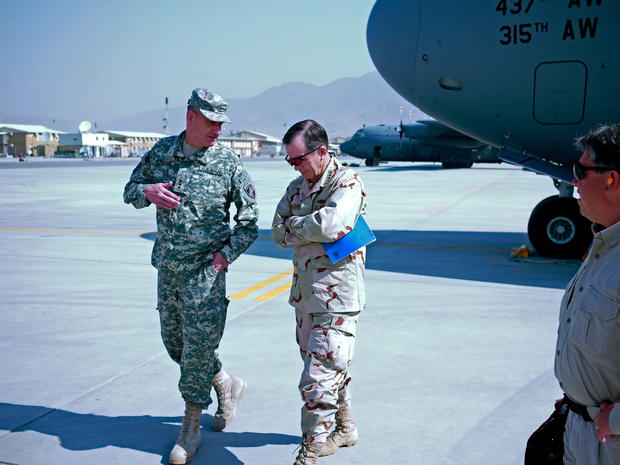Mullen calls Pakistan relationship strong on Middle East tour
This story was written by CBS News Washington bureau chief Christopher Isham
Chairman of Joint Chiefs of Staff Admiral Michael J. Mullen continued his whirlwind tour of conflict zones today -- starting the day at dawn in Islamabad, touching down in Kabul, for several hours and ending the day in Baghdad, Iraq.
Following a series of very tough interviews with the Pakistani media in which he made it very clear that he was not happy with the connections between the Afghan insurgent group known as the Haqqani network and the Pakistani intelligence service--the ISI, Adm Mullen met one-on-one with Pakistani army chief of staff, General Ashfaq Kiyani until 2 a.m.
Mullen: We cannot let the Pakistan relationship come apartIn an interview today aboard his aircraft, Mullen told reporters that the meeting with Kiyani went well and that the two men were able to work through the difficult issues between the two countries because of the underlying strength of the relationship. He said that despite recent tensions, the military relationship with the Pakistani military remains very strong and that coordinated campaigns in the northeastern Afghanistan had been very effective in routing insurgents on both sides of the border. According to another senior U.S. military official, U.S. military assistance to Pakistan is on track to reach $3 billion this year.
In Kabul, Mullen met with General David Petreaus and other U.S. commanders as well as Afghan President Hamid Karzai. Mullen was generally upbeat about the military progress on the battlefield in Afghanistan, pointing to successes in southern part of the country, particularly the provinces of Kandahar and Helmand, which he visited earlier in the week. Mullen is also encouraged by the emerging units of the Afghan Local Police -- pro-government, village based police forces that are beginning to take control of security in some districts that were previously dominated by the Taliban. He repeated Petraeus' warning, however that the gains remain "fragile and reversible."
Mullen arrived late Thursday in Baghdad for meetings with Iraqi Prime Minister Nouri al Maliki and other Iraqi officials. At the top of the agenda is the scheduled departure of all U.S. troops at the end of this year and whether Iraqi security forces are prepared to handle the persistent, albeit radically reduced security challenges. Officials including Defense Secretary Robert Gates have said that the U.S. would consider extending the U.S. military presence, if requested to so by the Iraqis. To date, no such request has been forthcoming. Admiral Mullen said that he would "engage" the Iraqi leadership on this question.
